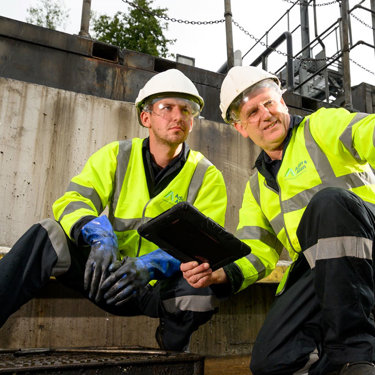Managing distressed cargo and hazardous waste: A case study at Southampton Docks
Published: 28 November 2023
Cargo management can be a daunting task, especially when faced with distressed cargo and hazardous waste. In August 2023, DP World Southampton encountered a challenging situation at Southampton Docks when two 40 foot Refrigerated ISO containers arrived damaged, each containing 25,000kg's of raw pork meat products. These "Reefers" had been left unrefrigerated for an extended period, posing health hazards and logistical challenges in transporting the containers safely. The task was clear: devan, decontaminate, and dispose of this cargo while ensuring the safety of all involved.
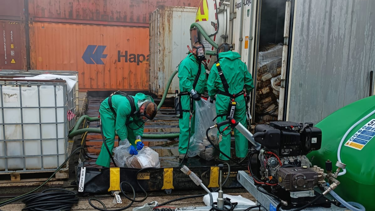
Project overview
The condition and extent of decomposition within the containers were unknown, but an initial site visit revealed leachates, flies, and a foul smell. These challenges prompted Adler and Allan, appointed by DP World Ltd, to determine the projects requirements and propose a safe system of work.
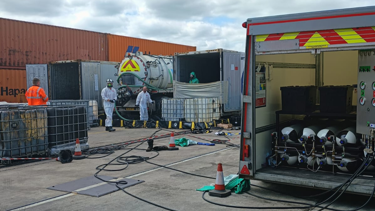
Our solution
To address this situation, several measures were implemented:
- Safety first: The safety of the response teams was paramount. Following security checks and site safety induction, a Risk Assessment Method Statement (RAMS) for shipside decontamination operations was submitted for review and approval, and a permit-to-work (PTW) was issued.
- Containment and odour control: The team cordoned off the work area using spare 40 foot ISO shipping containers, serving as a safety barrier, screen, and windbreak. Odour suppression systems were also used to minimize unpleasant smells.
- Bunded areas: Bunded areas for each container were established, creating hot, warm, and cold working zones. This ensured containment and safety during the operations.
- Waste management: Contaminated solids were recovered and double-bagged, minimizing the risk of leakage. They were placed into open-top Intermediate Bulk Carriers (IBC's), serving as both a suitable container for onward transport and a bund for added protection. Liquid waste was transferred to 205-litre drums for incineration.
- Disinfection: Both containers were disinfected with Sodium Hypochlorite and pressure washed.
- Regulatory compliance: All waste was segregated and treated in line with the principles of the waste hierarchy and regulatory guidance, ensuring compliance with relevant legislation.
Outcome and results
The results of this comprehensive approach were outstanding:
- The response teams safely devanned the two containers using air-supplied breathing apparatus.
- Hazardous solid waste was double-bagged and placed into IBC's, further reducing the risk of contamination.
- Liquid waste was safely transferred and disposed of via incineration.
- All waste was classified as Category 2 Animal Bi-Product (ABP) and disposed of in compliance with relevant regulations.
- A total of 78 IBCs of contaminated solid waste and 5 drums of contaminated liquid were safely disposed of.
- Importantly, there was no release of product to the environment during recovery operations, and no lost time safety incidents occurred throughout the project.
“Everything went well with the team, very professional throughout, and kept us up to date with the proceedings.”
Kevin Rusdale, Cargo Manager & Dangerous Goods Safety Advisor (Breakbulk & Out of Gauge Operations) DP World Southampton
The successful management of distressed cargo and hazardous waste at Southampton Docks demonstrates the importance of a meticulous approach, strong safety measures, and compliance with regulations. DP World Southampton and Adler and Allan's collaborative efforts not only addressed the challenges posed by these "Reefers" but also ensured a safe and environmentally responsible solution. This case study serves as an example of effective hazardous waste management in challenging conditions, with the safety of workers and the environment at the forefront
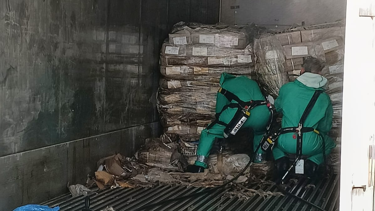
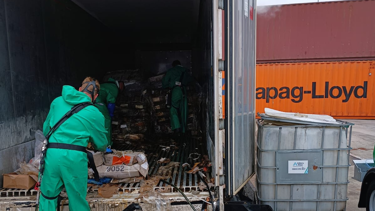
More from our Knowledge Hub
 News
NewsAdler & Allan announces new investment from Private Equity at Goldman Sachs Alternatives
 Insights
InsightsDemystifying the new biodiversity net gain legislation
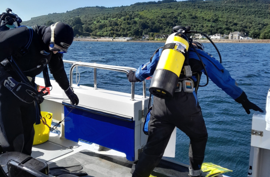 Case study
Case studyBlue carbon habitat suitability assessments in Scotland as part of Carbon Neutral Islands project
 Insights
InsightsChanges to ESOS reporting system and compliance notification deadline extended to 6 August 2024
Keep your business compliant and protect the environment while reducing the risk of operational downtime
Find out how Adler and Allan reduce your risk and support you on your journey to Net-Zero through the management and maintenance of assets.
Contact our experts